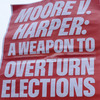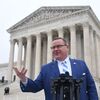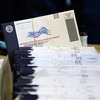
[ad_1]

A demonstrator holds up an indication that reads “HANDS OFF OUR STATE COURTS!” throughout a December 2022 rally in entrance of the U.S. Supreme Court in Washington, D.C.
Andrew Harnik/AP
cover caption
toggle caption
Andrew Harnik/AP

A demonstrator holds up an indication that reads “HANDS OFF OUR STATE COURTS!” throughout a December 2022 rally in entrance of the U.S. Supreme Court in Washington, D.C.
Andrew Harnik/AP
An uncommon transfer by North Carolina’s highest state court docket has raised the query of whether or not the U.S. Supreme Court will find yourself throwing out a significant election case a few once-fringe idea that might upend federal elections throughout the nation.
Late final week, the North Carolina Supreme Court — the place Republican justices not too long ago took over the bulk after final yr’s elections — granted a request from GOP state lawmakers to rehear the case, which, on the state degree, includes voting maps for each congressional and state legislative districts.
And relying on how and when the state court docket guidelines on the congressional map after its scheduled March 14 rehearing, the authorized path forward for this carefully watched case on the U.S. Supreme Court might get messy.
Election watchers have been protecting their eyes on this case — identified on the U.S. Supreme Court as Moore v. Harper — as a result of it might have sweeping implications on upcoming federal elections. At its coronary heart is the broadly disputed thought referred to as the “independent state legislature theory.” It claims the U.S. Constitution provides state legislatures a particular sort of energy of figuring out how federal elections are run with none checks or balances from state constitutions or state courts.
Republican state lawmakers used that idea to justify arguing earlier than the U.S. Supreme Court that the North Carolina Supreme Court, which beforehand had a Democratic majority, overstepped its authority by placing down a legislature-approved map of congressional districts for violating North Carolina’s structure.
The North Carolina Supreme Court agreeing to rehear the case has opened up the chance that the state court docket’s February 2022 determination towards the legislature-approved map may very well be overruled.
That sort of reversal might make the case moot by resolving the authorized dispute, which then might not require the U.S. Supreme Court’s assessment.
But the nation’s highest court docket, which heard oral arguments on this case in December, might nonetheless transfer ahead with its personal ruling on this case by late June, when its present time period is ready to finish, says Carolyn Shapiro, a regulation professor and co-director of Chicago-Kent College of Law’s Institute on the Supreme Court of the United States.
“The timing matters. Even if the North Carolina Supreme Court ultimately says that the prior opinion was a mistake, if they do that after the [U.S.] Supreme Court rules in Moore v. Harper, I don’t think it matters,” Shapiro explains. “There’s a little bit of a game of chicken.”
And if the state court docket releases a brand new determination that overturns its earlier ruling earlier than the U.S. Supreme Court guidelines, Shapiro says there may very well be an argument for the excessive court docket to weigh on this time period throughout this offseason for main federal elections.
“In other types of cases, I think the U.S. Supreme Court would probably wait and see what the state court does. But because this case is of such significance in terms of how elections will operate going forward, there are good reasons for the U.S. Supreme Court to decide it now,” Shapiro provides.
Another layer of issues may very well be launched by how the North Carolina Republican state lawmakers and their challengers react to the state court docket’s new ruling.
‘State court docket elections matter’
And the flip-flopping in state court docket rulings that might come out of the North Carolina Supreme Court’s rehearing for this case might develop into extra frequent in different components of the nation, explains Robert Yablon, an affiliate professor of regulation who helps lead the University of Wisconsin Law School’s State Democracy Research Initiative.
“As state supreme courts around the country are increasingly asked to address hot-button issues,” Yablon says, “we may see more of these requests and we may see more shifting of doctrine in ways that we don’t see quite as much of in the U.S. Supreme Court, where you don’t have as much turnover as you sometimes see in state courts.”
It’s a reminder, Yablon provides, that “state court elections matter.”
In an opinion dissenting from the North Carolina Supreme Court’s determination final week to rehear each this case and another that had invalidated state voter ID requirements, the court docket’s two Democratic justices famous that “in a single day, the majority has granted more petitions for rehearing than it has over the past twenty years.”
The public’s belief within the state court docket, wrote Justice Anita Earls within the opinion joined by Justice Michael Morgan, “depends on the fragile confidence that our jurisprudence will not change with the tide of each election. Yet it took this Court just one month to send a smoke signal to the public that our decisions are fleeting, and our precedent is only as enduring as the terms of the justices who sit on the bench.”
Regardless of how this North Carolina case seems on the state court docket, the impartial state legislature idea is prone to proceed hovering across the U.S. Supreme Court’s docket.
Many court docket watchers have famous the difficulty in answering all of the legal questions the disputed idea raises by means of this North Carolina case.
Republican state lawmakers from Ohio have already teed up another redistricting case about the theory that is at the moment ready for the justices to resolve whether or not to tackle.
Edited by: Benjamin Swasey
[adinserter block=”4″]
[ad_2]
Source link



